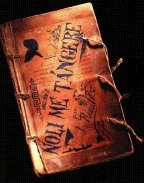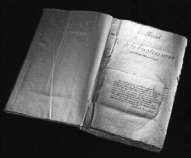 Having completed his studies in Europe, young
Juan Crisostomo Ibarra came back to his motherland. In commemoration of his return after a 7-year absence, Capitan Tiago (Don Santiago de los Santos) threw a get-together party, which was attended by Fray Damaso, Fray Sibyla, Lieutenant Guevarra, Doņa Victorina, and other such prominent figures. In an unfortunate incident, Fray Damaso, former curate of San Diego, belittled and slandered the youngster. Ibarra, in accordance with his educated and peaceful nature, brushed off the insult and took no offense, instead politely excusing himself and leaving the party because of an allegedly important task.
Having completed his studies in Europe, young
Juan Crisostomo Ibarra came back to his motherland. In commemoration of his return after a 7-year absence, Capitan Tiago (Don Santiago de los Santos) threw a get-together party, which was attended by Fray Damaso, Fray Sibyla, Lieutenant Guevarra, Doņa Victorina, and other such prominent figures. In an unfortunate incident, Fray Damaso, former curate of San Diego, belittled and slandered the youngster. Ibarra, in accordance with his educated and peaceful nature, brushed off the insult and took no offense, instead politely excusing himself and leaving the party because of an allegedly important task.
Ibarra has a sweetheart by the name of Maria Clara, an extraordinarily beautiful lady. She is known as the daughter of Capitan Tiyago, an affluent resident of Binundok. The day after the humbling party, he went to see Maria Clara. Their long-standing love for each other was clearly manifested in this meeting, and Maria Clara could not help but reread the letters her sweetheart had written her before he went to Europe.
Before Ibarra left for San Diego, Lieutenant Guevarra (a Guardia Civil), revealed to him the incidents preceding the death of his father Don Rafael. Don Rafael was a rich haciendero of the town.
According to the Lieutenant, Don Rafael was unjustly accused of being a heretic, in addition to being a filibuster --- an allegation brought forth by Fray Damaso because of Don Rafael's non-participation in Confession and Mass rites. Fray Damaso's complaint against Ibarra's father was made even more outstanding by the occurrence of another incident. Once Don Rafael saw a tax collector and a student fighting. Out of compassion, he helped the child. The tax collector was greatly irked and picked a fight with Don Rafael. Unfortunately, the Spanish tax collector fell, got his head hit against a rock, and died. The collector's death was blamed on Don Rafael, and he was investigated. Suddenly, all of those who think ill of him surfaced with additional complaints. He was imprisoned, and just when the matter was almost settled, he got sick and died in jail. Still not contented with what he had done, Fray Damaso arranged for Don Rafael's corpse to be dug up and transferred from the Catholic cemetery to the Chinese cemetery, because he thought it inappropriate to allow a heretic such as Don Rafael a Catholic burial ground. Unfortunately, it was raining and because of the bothersome weight of the cadaver, the one in charge of burying the body decided to throw it in the river.
Revenge was not in Ibarra's plans; instead he carried through his father's plan of putting up a school, since he believed that education is a liberating factor.
During the inauguration of the school, Ibarra would have been killed in a sabotage had Elias not saved him. Instead the hired killer was the one who was killed. Because of this unfortunate incident, Maria Clara got sick but was luckily cured by the medicine Ibarra sent her.
After the inauguration, Ibarra hosted a luncheon during which Fray Damaso again insulted him. Ibarra ignored the priest's insolence, but when the latter messed with the dignity of his dead father, he was no longer able to restrain himself and lunged at Fray Damaso, prepared to stab the latter for his impudence. His beloved Maria Clara stopped him just in time.
Because of the aforementioned incident, the Archbishop of the Roman Catholic Church excommunicated Ibarra. Fray Damaso took this opportunity to persuade the already-hesitant parents of Maria Clara to forbid their daughter from marrying Ibarra. The priest wished the beauteous Maria Clara to marry a Spanish named Linares who just arrived in the Philippines.
With the help of the Captain General, Ibarra's excommunication was nullified and the Archbishop decided to accept him as a member of the Roman Catholic Church once again. But, as fate would have it, some incident of which Ibarra had known nothing about was blamed on him, and he was wrongly arrested and imprisoned. But the accusation against him was overruled because during the litigation that followed, nobody could testify that he was indeed involved in the trouble. Unfortunately, his letter to Maria Clara had somehow gotten into the hands of the jury and was manipulated such that it then became evidence against him.
Meanwhile, in Capitan Tiyago's residence, a party was being held to announce the upcoming wedding that was to take place between Maria Clara and Linares. Ibarra, with the help of Elias, took this opportunity and escaped from prison. But before leaving, Ibarra talked to Maria Clara and accused her of betraying him, and act which was done by giving the letter he wrote her to the jury. Maria Clara explained to Ibarra that she would never give him away and that the letter which the jury has is not the letter he wrote her, but instead were a couple of letters written by her mother even before she, Maria Clara, was born. The letter stated that her mother was raped by Fray Damaso and that she was therefore not the daughter of Capitan Tiyago, but of Fray Damaso.
Afterwards, Ibarra and Elias boarded a boat and fled the place. Elias instructed Ibarra to lie down and the former covered the latter with grass so as to conceal the latter's presence. As luck would have it, they were spotted by their enemies. Elias thought he would outsmart them and jumped into the water. The men rained shots on the person in the water, all the while not knowing that they were hitting the wrong person.
It reached Maria Clara's knowledge that Ibarra was killed in a shooting incident, and she was greatly overcome with grief. Robbed of hope and severely disillusioned, she asked Fray Damaso to get her into a nunnery. Fray Damaso reluctantly agreed because Maria Clara explicitly threatened to take her own life if she was not allowed to become a nun.
But what Maria Clara read in the papers was untrue, since Ibarra was not dead; he was not the one who had taken the shots of the enemies.
It was Christmas Eve when Elias arrived at the Ibarra forest, gravely wounded and barely alive. It was in this forest that Elias found Basilio and his lifeless mother, Sisa. Elias died without having seen the triumph of his country.
main points
characters
[back to top]
[noli me tangere]
[el filibusterismo]
[his masterpieces]











